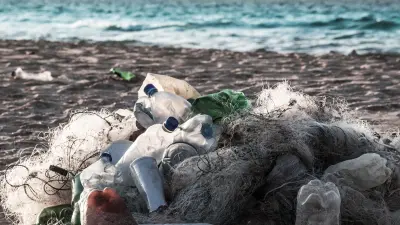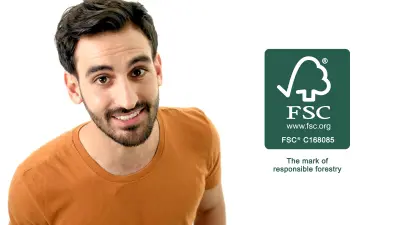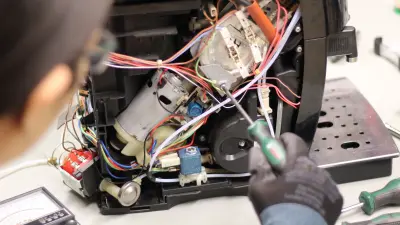Added value from waste

Plastics have become an integral part of our daily lives. However, a significant portion ends up in landfills or our oceans, including in the Davao Gulf in the Philippines. The WWF and Bosch Power Tools are working to reduce plastic pollution in the area. Through close collaboration with the local community and government, they aim to find sustainable solutions to protect the marine environment and secure the livelihoods of the residents.
A life without plastic is almost unimaginable in today’s modern world. It is no surprise to learn that global plastic production has increased two hundredfold since 1950¹ and continues to grow by four percent every year.² The problem is that most plastic products are only used for a short length of time and over 60 percent of all plastics ever produced are now in landfills or in the environment. An estimated 80 to 150 million tons of plastic are floating in our oceans³ – and the problem is only getting worse.
Sustainable initiatives in Davao Gulf
The Davao Gulf in the Philippines is located in an area known as the Coral Triangle, the most biodiverse marine area in the world. The WWF has been active here since 2015 and is committed to the protection and sustainable use of the waters. Bosch Power Tools has been supporting four WWF projects since 2023, one of which is the project in the Philippines. The division regards this project as particularly important, since plastic is also an important component in power tools and their packaging. As part of the sustainability strategy and the partnership with WWF Germany, Power Tools is working to reduce the quantity of material used and to use recycled materials wherever possible.

The Davao Gulf
is located in an area known as the Coral Triangle, the most biodiverse marine area in the world.
Together against the torrent of plastic
Ricky Biyo is from Davao and manages the project on site for the WWF. He and his team support the communities in effectively curbing pollution in the bay. Ricky knows all too well that “The significant plastic waste pollution is not only endangering the marine ecosystem, but also the livelihood of the local population.” The aim of the project is to reduce the amount of plastic entering the Davao Gulf by at least 30 percent by 2028. To achieve this goal, the project aims to significantly improve the collection, recycling and disposal of recyclables in the two cities of Davao City and Cagayan de Oro, which together have a total population of almost 1.9 million people.
“We help communities at different levels,” says Ricky. “For example, we work closely with local politicians, and a local by-law to restrict single-use plastic has already been passed.” Although a complete ban on single-use plastic would be a groundbreaking move, there are some single-use products that people do not want to get rid of completely for reasons of hygiene and sanitation, and there are not yet enough inexpensive alternatives available. Nevertheless, Ricky remains optimistic: “The political pressure for an international agreement on plastics is increasing and together with our local partners we are looking for sustainable solutions.”

Efficient waste management
In the city of Cagayan de Oro, a comprehensive waste analysis and characterization study by the WWF revealed exciting findings: More than half of the waste produced consists of organic waste – a huge potential for composting. At the same time, the study shows that around ten percent of mixed general waste could be recycled if disposed of correctly. Action plans have been developed on the basis of these findings to improve the collection, waste and recycling system in a targeted way. Here too, close cooperation between all those involved along the value chain is particularly important.
Examples include contact being established with dealers of second-hand goods and others working in plastics recycling, who are now better connected to municipal collection points. Larger partners, including a company that processes plastic waste into new products such as tables, chairs or pots, are also involved. Closer cooperation between businesses and local authorities will improve the sorting, quantification and secure delivery of the collected plastics. This also involves materials that are difficult to recycle, such as laminate packaging or soft plastics. The goal is to find practical solutions for these low-grade types of plastic and return them to the recoverable material cycle. The result is a win-win situation for the environment, local communities and the economy.
Questions for the WWF
Dr. Stefan Ziegler is a biologist and responsible for projects in Southeast Asia at WWF Germany. He has been working for the WWF for over 20 years and has led numerous projects in the area of plastic waste and marine pollution.
Stefan, why is it important for the WWF and Bosch Power Tools to provide support right here in the Philippines in the Davao Gulf?
We are always reviewing in which regions our expertise and funding are urgently needed and where we have a chance of successfully implementing a project. The Davao Gulf is an area of high biodiversity that is acutely threatened by plastic waste. We have a very committed team who have excellent contacts with local political decision-makers on the ground. These are good starting points.
What is the main aim of the project?
The overarching project objective is to reduce plastic waste pollution in the Davao Gulf by at least 30 percent by 2028.
How is the project organized in the region? How is the cooperation with local authorities and residents going?
We have a team of three employees in Davao City. They discuss the results of studies with the authorities and political decision-makers and make recommendations for action. They are supported by international WWF experts, particularly in the areas of waste management, corporate work and communication.
What are the biggest challenges that you are facing?
Our project objective is very ambitious and can only be achieved if everyone pulls together. It is easy to understand the importance of separating waste streams as soon as they are generated, which is the only way to ensure separation by type of waste. The difficulty comes with the logistical implementation, as collected waste has to be stored temporarily, unloaded and loaded again. Such transfer stations need space – and space is in short supply in densely built-up urban areas. The high temperatures locally mean a certain amount of odor nuisance is usually unavoidable and it is not easy to find suitable areas.
What has been the biggest success since the project began?
I am a fan of science-based data. I knew from other projects in Asia that the organic portion of the waste is very high. Our waste analysis and characterization study in Cagayan de Oro showed that more than half of the waste in the Philippines is organic and that a further ten percent of the general waste produced could be transferred to the recoverable material cycle in the future. Now we can use these findings to effectively reduce the amount of plastic entering the natural environment.

Summary
The collaboration between WWF Germany and Bosch Power Tools in the Gulf of Davao is a promising example of how local and global actors can work together to tackle the plastic crisis. The goal of reducing plastic pollution by 2028 is not only a step towards environmental protection but also an opportunity to raise awareness about sustainable practices among the community and drive long-term change.
¹Geyer, R., Jambeck, J. R., & Law, K. L. (2017). Global plastics production [Data set]. Our World in Data.
²WWF Germany (2023). Factsheet: Plastic waste in the world’s oceans. WWF.
³Ellen MacArthur Foundation (2017). The new plastics economy: Rethinking the future of plastics & catalysing action.





